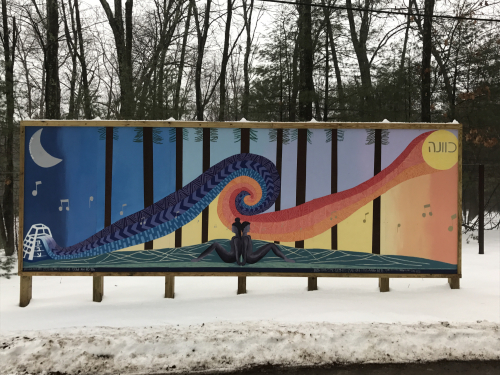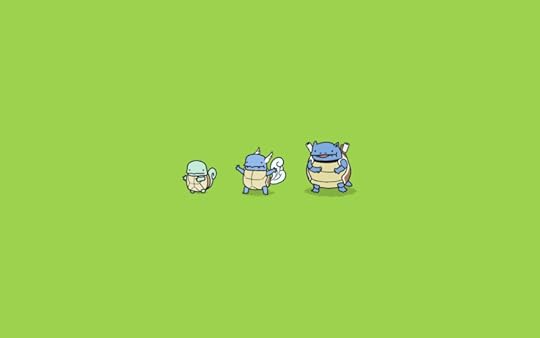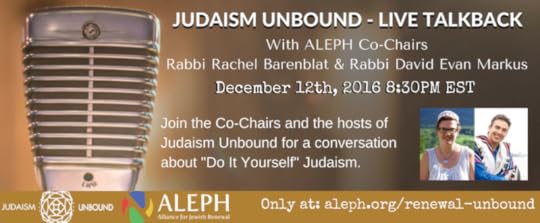Rachel Barenblat's Blog, page 94
December 23, 2016
Chanukah music
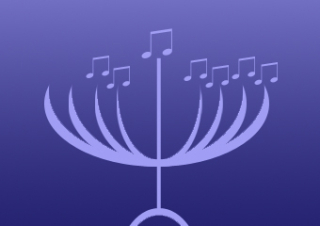 A friend asked me recently for suggestions of "good Chanukah music," aside from Peter, Paul & Mary's "Light One Candle" and the Stephen Colbert / Jon Stewart contemporary classic "Can I Interest You In Hanukkah?"
A friend asked me recently for suggestions of "good Chanukah music," aside from Peter, Paul & Mary's "Light One Candle" and the Stephen Colbert / Jon Stewart contemporary classic "Can I Interest You In Hanukkah?"
The challenge, of course, is that Chanukah is a minor Jewish holiday in the grand scheme of things. There are a few decent Chanukah songs, but this isn't the holiday that has inspired the greats of my tradition to plumb their musical depths.That said, I promised her I'd come up with a list of a few things, and I'm sharing it here in case anyone else has similar needs.
The first thing that comes to mind is Anander Mol, Anander Veig, a compilation of remixes released by Tablet magazine a few years back at Chanukah-time. At that link you can listen to individual tracks or download the whole album.
Bare Naked Ladies put a Chanukah song on their holiday album a while back, which is actually pretty charming.
If you are a fan of a cappella, you might enjoyS ix13's Chanukah (Shake It Off). On a similar note, there's the Maccabeats' All About That Neis. And, of course, don't miss this year's release, Hasmonean, a delightful Hamilton medley parody.
Nava Tehila, the Jewish Renewal community of Jerusalem, is led by a trio of extraordinarily talented musicians. Here's an excerpt from a concert they put on at a Benedictine monastery in Israel at Chanukah a few years ago, which begins with their performance of "Maoz Tzur" (a.k.a. Rock of Ages.)
The next track that comes to mind is Shir Yaakov's "Or Zarua." It's not a Chanukah song per se, but it is a song about light -- which seems fitting to me for these dark days as the winter solstice recedes.
Shir Yaakov is part of Darshan. Their album Deeper and Higher is terrific. I'm especially fond of the track "Before Darkness," which remixes the "Or Zarua" I linked to above. My other favorite track on that album is probably "For the Sake of Unification." Now we've moved firmly out of the realm of Chanukah music and into the realm of "good Jewish music to which one could listen at Chanukah (or any time)."
Another fun one to put in a holiday playlist -- again, not a Chanukah song, but one that makes me smile -- is this version of "Adon Olam" sung to the tune of Pharrell Williams' "Happy." (My other favorite setting of Adon Olam these days is this one by Cantor Azi Schwarz, to the tune of "You'll Be Back" from Hamilton.)
If you have recommendations of Chanukah music that works for you, feel free to leave them in comments!

December 19, 2016
A weekend with NHC
I spent a lovely weekend at Camp Ramah at the National Havurah Committee's New England Retreat.
It was sweet to spend the weekend with people who are passionate about their Judaism. Everyone who comes to a weekend retreat like this one is invested in Jewish life and practice, and there's something restorative about being surrounded by others who care about some of the same things that matter so deeply to me.
It was fun both to reconnect with some of my ALEPH hevre (including Rabbi David Seidenberg of NeoHasid, Rabbi Cherina Eisenberg, and rabbinical student Carl Woolf) and to meet other NHC regulars, many of whom were unfamiliar with ALEPH and Jewish Renewal. It's fun to get to be an ALEPH ambassador and to answer questions about who we are and what we do. It was fun to share poems on Saturday night, to teach a psalm-writing workshop on Sunday morning, and to co-lead davenen (prayer) on Sunday with Rabbi David, too.
We planned Sunday morning davenen with the intention of sharing Jewish Renewal spiritual technologies: some favorite melodies and chants, attentiveness to transitions between weekday nusach (the melodic system standard for weekday prayer) and melodies, bilingual davenen, freeform English prayer on the themes of the classical Hebrew (especially for the bakashot, the "requests" at the heart of the weekday amidah), imagery and meditation, and more. I think our offering was well-received, and it was sweet for me to get to ring in the new week with this kind of davenen b'tzibbur (prayer in community.)
Deep thanks to Mark and Steve for inviting us to be present, to teach and to learn, and to enjoy a beautiful snowy weekend in the woods outside of Palmer!

December 12, 2016
A piece of my own history
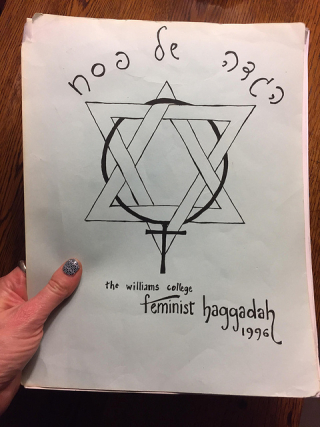 Mostly what I did during my first Williams College Jewish Association board meeting a few weeks ago was listen. I asked a couple of questions, but my purpose there was to begin learning: about who the students are, and what matters to them, and what they're working on.
Mostly what I did during my first Williams College Jewish Association board meeting a few weeks ago was listen. I asked a couple of questions, but my purpose there was to begin learning: about who the students are, and what matters to them, and what they're working on.
At the end of the hour, as they gathered their coats to leave, Evan -- the co-president of WCJA -- said to me, "Wait a second, I have something for you." What he handed me was a piece of my own history: an original copy of the haggadah from the Williams College Feminist Seder from 1996.
1996 was my senior year at Williams, and I was an active participant in creating that haggadah and that seder. (The cover is my own handwriting -- I remember sitting at my desk, pencilling and then inking that intertwined woman symbol and Star of David.) It was wild to stand in the very room where our feminist seders took place, holding that staple-bound booklet.
I have some Williams feminist haggadot in my archives. Ten years ago, WCJA invited me to come and speak at the Jewish Religious Center about my experiences with the Williams College feminist seder, which inspired me to find those old haggadot and reread them. (I wrote about that at the time: Six years of Williams College feminist haggadot.)
But there's something extra-special to me now about this one, because someone saved it. Someone saved it, and passed it down, and handed it on, until it came into the hands of the current leadership of the Jewish Association, twenty years after it was assembled and printed and used.
Leafing through it now, I'm moved by several things. One is how I can see glimmers of this haggadah in my Velveteen Rabbi's Haggadah for Pesach, the haggadah that I have for years shared online as a free download. Another is the poetry we chose -- and the fact that many of the poets there who were simply revered names to me twenty years ago are now colleagues and friends. (That feels to me like a sign that I am doing something right with my life.)
I'm moved, also, by the awareness that this haggadah represents a particular moment in the evolution of Jewish feminism. Today's students express their Jewishness in an intersectional framework for which we didn't have the language twenty years ago -- or at least I didn't. I know that there haven't been feminist seders at Williams in many years. I wonder whether the spiritual yearnings that used to be expressed through the vehicle of that experience are now bubbling up in some other way.
This physical object teleports me temporarily through time. I'm grateful to have this tangible reminder of what was important to me in college, and I'm gratified at the reminder that the work I'm doing now has its roots in who I was then.

Renewing my relationship with haftarah
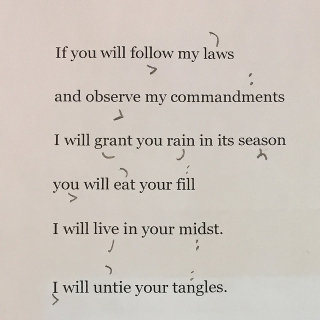 At the shul where I serve, we don't usually read the haftarah, the reading from the Prophets that in more traditional synagogues is paired with the weekly Torah reading. This decision was made years ago, largely for reasons of attention span and time. People don't want services to be "too long," and generally don't have much patience for lengthy chanted texts in a language that's not the vernacular.
At the shul where I serve, we don't usually read the haftarah, the reading from the Prophets that in more traditional synagogues is paired with the weekly Torah reading. This decision was made years ago, largely for reasons of attention span and time. People don't want services to be "too long," and generally don't have much patience for lengthy chanted texts in a language that's not the vernacular.
The downside of this is that my community almost never hears the beautiful melodies of haftarah trope. The only time I typically chant haftarah is on Rosh Hashanah, and on that day I always chant the traditional blessings before and after the haftarah, too. But in place of the traditional haftarah text I chant a contemporary poetic rendering of the reading for that day, in English, set in that melodic mode.
Chanting English language poetry in haftarah trope is something I learned from my teacher Hazzan Jack Kessler. He's crafted some beautiful settings of contemporary poetry for use in this way -- and not only contemporary poetry, but also other prophetic texts. I've been blessed to hear him chant the Declaration of Independence in haftarah trope when I've been with my ALEPH rabbinical school community on the Shabbat nearest to the Fourth of July.
I love this practice for at least two reasons. I love the fact that it keeps the plaintive lilt of this melodic system in our hearts and minds -- especially since this is a melodic system that would otherwise be lost in communities like mine where we don't chant the classical haftarah most of the time. The system of the טעמי המקרא / ta'amei hamikra (the markings on the text that denote snatches of melody, a.k.a. trope) is a fascinating one, and I love the way the trope markings serve to give the text phrasing and nuance. I also love how this practice offers an opportunity to lift up texts, contemporary and otherwise, that serve a prophetic function. As a lover of poetry, I am always delighted by opportunities to uplift poems that might speak to people where they are.
One of this year's b'nei mitzvah students at my shul expressed an interest in haftarah. We looked at the haftarah reading for her Torah portion, and found it not particularly engaging. So I told her about this practice I learned from Hazzan Jack, and invited her to consider whether there is a contemporary poem that speaks to her. I reminded her that she's heard me chant contemporary poems in haftarah trope before -- a setting of the story of Chanah on the first day of Rosh Hashanah, a Marge Piercy poem on the second day. She did some digging, and came back to me with one of my poems from 70 faces (Phoenicia, 2011) -- the one that goes with her Torah portion. I've set it to haftarah trope, and will work with her on learning it.
Setting one of my own poems in this melodic system was a moving experience for me. It gave me occasion to reflect on how I phrase the poem when I read it aloud, and how I want the trope marks to "set" the poem musically. And it made me realize that there's no reason for me to limit my English-language haftarah poetry chanting to once a year. I could make a more regular practice of chanting a relevant poem, in the place in the flow of the service where the haftarah goes. I would have to abbreviate somewhere else, of course, in order not to run overtime. Perhaps I'll chant a haftarah poem on weeks when I don't write a d'var Torah, or will shorten p'sukei d'zimrah (the introductory poems and psalms of praise) on weeks when I have a haftarah poem to share. But I love these melodies, and would love to weave them into the consciousness of the community I serve.
I'm grateful to my b'nei mitzvah student for making this request, which has re-enlivened my desire to renew and reclaim this piece of the tradition in a way that my community can access and enjoy.
A setting of a poem by David Rosenberg in haftarah trope, from Hazzan Jack Kessler, published in Kol ALEPH
An article he wrote about this practice, published in Kerem Magazine Volume 14 / 2014-5775 - English Leyning: Bringing New Meaning to the Torah Service[pdf]. At the end of the article there's a scan of his setting of texts from the Reverend Martin Luther King z"l for use on the Shabbat of MLK weekend.

December 10, 2016
In this place
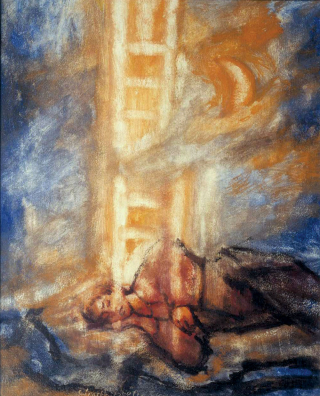 In this week's Torah portion, our forebear Jacob is on the run from his twin brother Esau. He lies down with his head on a stone, and he has a dream, or a vision, of a ladder rooted in the earth with its top penetrating the very heavens. On that ladder he sees angels moving up and down continuously, traveling between earth and heaven and earth again. When he wakes, he exclaims "God was in this place, and I -- I did not know!"
In this week's Torah portion, our forebear Jacob is on the run from his twin brother Esau. He lies down with his head on a stone, and he has a dream, or a vision, of a ladder rooted in the earth with its top penetrating the very heavens. On that ladder he sees angels moving up and down continuously, traveling between earth and heaven and earth again. When he wakes, he exclaims "God was in this place, and I -- I did not know!"
I can't think of a more appropriate Torah portion for our New Member Shabbat. As I look around the room at all of your faces, I know that God is in this place for sure.
Finding God in this place is what we're all about. Not only "this place" in the sense of the synagogue building, though we are blessed with a beautiful building and it is easy to feel the presence of the Holy when we gaze through these enormous windows at the willow tree and the mountains.
Some of us find God in this place via davenen, which is to say, prayer. Davenen is a Yiddish word. But the Hebrew word for prayer is להתפלל, which means to judge oneself. Some of us find God here by entering into prayer, and in so doing, coming to know ourselves more deeply. What arises in me as I bless the creator of light this morning? And what will arise in me as I bless the creator of light tomorrow morning, or next Shabbat, or the Shabbat after that? As we pray together, we witness our own subtle movements of soul. As we say and sing these familiar words we connect ourselves with the community and with our tradition, and maybe we find God in that connection.
Some of us find God in this place via service -- not the "service of the heart" that we know as prayer, but service of others. Those who gather here each month to cook meals for homebound seniors as part of our Take and Eat crew find God in dedicating their hands and hearts to feeding the hungry. Those who bring childrens' pajamas to our collection box, so that those who can't afford warm winter sleepwear for their children can rest easy knowing that their kids are safe and warm on the coldest nights... those who bring toys to our gift collection box, so that those who can't afford gifts for their kids this winter can rest easy knowing that there is something for them to give... in serving others here we make this place holy, and maybe we find God in that.
Some of us find God in this place through Torah study. Whether that means sitting here in the sanctuary discussing the weekly Torah portion, or studying a text during the kiddush after services, or participating in our book group, or taking part in our Introduction to Judaism class -- all of these are forms of Torah study, and all of these are doorways to noticing the presence of God.
Look around the room and recognize that God is in this place. God is in this place because we make this place holy with our choices, with our study, with our service, with our prayer.
One of our tradition's names for God is המקום –– "The Place." God is in every place where people truly meet one another. God is in every place where people pray, and in every place where Torah is learned. We read in the Mishna (Avot 3) that wherever two people gather and study Torah together, the Shekhinah is with them. Shekhinah is one of our tradition's names for the immanent, indwelling Presence of God. Sometimes we experience God as transcendent -- up there, out there, far away, too vast to imagine. And sometimes we experience God as immanent -- right here, with us, even within us. In Torah (Exodus 25) we read ועשו לי מקדש ושכנתי בתוכם -- "Let them make Me a sanctuary, that I may dwell among them." Or maybe it means "Let them make Me a sanctuary, that I may dwell within them."
We have made a sanctuary here in northern Berkshire. May it be a place where God dwells with us and within us. May we always wake to the presence of God in this place, in this moment, in this interaction, in this breath. May each of us be a blessing to this congregation, and may this community be a blessing for each of us, now and always.
Cross-posted to my From the Rabbi blog. Image by Albert Houthouesen.

December 9, 2016
Ascent
Immerse, my body bare as birth.
Emerge with my skin tingling.
Ascend the fifteen stairs to you
singing love songs on every step.
At the door to the holy of holies
I vibrate like a struck bell.
My fears rise up. What makes me think
I'm good enough for you?
Only this: you make me want
to shine as only I can shine.
Let me find favor in your eyes.
I ache to draw near to you.
Nothing I can offer would be enough.
All I have is this heart, bruised
and tender. All I am is this heart,
saying your name with every beat.
Immerse, my body bare as birth. In the Avodah service on Yom Kippur we read about how the high priest used to prepare for the work of Temple service by immersing in a mikvah.
Ascend the fifteen stairs[.] In Hebrew, the number 15 can be spelled יה, which is a name of God. There are fifteen psalms of ascent, which may have once been sung on each of fifteen steps in the Temple in Jerusalem.
[T]he holy of holies[.] The inner sanctum of the Temple was known as the holy of holies, which was entered only by the high priest and only once a year.
I ache to draw near to you. The Hebrew קרבן, often translated as "sacrifice" or "offering," comes from the root קרב which means drawing-near.
This is another poem in my ongoing Texts to the Holy series.
Shabbat shalom to all who celebrate.

December 7, 2016
Evolving, like Pokémon
My seven year old is a huge fan of the Japanese cartoon series Pokémon. If you have never shared your life with a Pokémon fan, you might not know that Pokémon are animated creatures (many of them adorable) with varying skills and talents.
On the instruction of their trainers, Pokémon battle one another to see who will prevail. When they are in circumstances of extraordinary extremis, they glow with an inner light and then evolve into new forms with new names. When a Pokémon evolves, it retains the memories, relationships, and general personality of its previous form. But it also changes, growing into a new version of itself with new skills and abilities, denoted by its new name.
There are parallels between this cartoon and the core story of Jewish becoming. Torah tells us that once there were a pair of twin brothers named Jacob and Esau, who wrestled with each other even in the womb. They were estranged for many years. And then came the night when Jacob knew that in the morning he would encounter his estranged brother again...
That's the opening of my latest essay for The Wisdom Daily, which explores the intersection of Pokémon and next week's Torah portion. Read the whole thing here: Evolving, like Pokémon.

DIY Judaism with ALEPH and Judaism Unbound
Episode 22 of the Judaism Unbound podcast featured Rabbis Rachel Barenblat and David Evan Markus, co-chairs of ALEPH: Alliance for Jewish Renewal. In this live talkback at 8:30pm EST on Monday December 12, join the co-chairs and the hosts of Judaism Unbound for a conversation about "Do It Yourself" Judaism. What does it mean to take Judaism into our own hands and to seek in Judaism answers to the questions of this hour? How are people reshaping and renewing Judaism today? How can we make Judaism our own, and what tools and practices are at our disposal? Come talk with us about all of this and more.
The talkback will take place via Google Hangouts, and will be streamed to YouTube. The YouTube video will stay online even after the talkback is over, so those who aren't able to join us at that hour can watch it later. Shortly before 8:30pm EST on Monday, the Renewal Unbound page on the ALEPH website will be updated with a link to the Google Hangout where people can join us, and we'll embed the YouTube video on that page after the event is over. If you're able to be online on Monday night, join us on Google Hangouts and talk with us about DIY Judaism and the Jewish future you want to co-create!
(For those who are Facebook users, here's a Facebook Event for the Talkback -- let us know if you can join us, and start thinking about the questions you want to ask...)

December 5, 2016
Our spiritual work is our life as it is
"I would be more spiritual if my circumstances were more perfect."
That's the "first illusion" cited by Ward Bauman in "Letting God be God," an article in Presence about lessons learned from Meister Eckhart. (And wow, is it a familiar illusion to me!) Bauman writes:
Meister Eckhart is emphatic that our spiritual work begins where we are right now, because God is in our circumstances as they are....
Eckhart goes to the heart of the matter when it comes to spiritual work. The sense that there might be perfect circumstances that would allow us to be more spiritual is simply an illusion. We cannot escape our circumstances for some better or more spiritual condition. Our spirituality is never dependent upon the exterior conditions but rather upon the inner condition of our heart....
Our spiritual work is our life as it is.
I read the article while sitting with my sick kid who was curled up on the couch watching cartoons and found it surprisingly relevant. I know that Meister Eckhart was a Christian monastic. Rearing children was not part of his life's work or his spiritual practice. But his point that "our spiritual work is our life as it is" can be a deep teaching about spiritual life and parenthood.
There's a temptation to imagine that if I hadn't been home with my sick kid, I might have done something lofty and "spiritual" with my day. But I know that in truth, spiritual elevation arises in the attention and intention I bring to whatever is at hand. That's true whether I'm leading my community in prayer, or checking my son's temperature for the umpteenth time today.
The struggle to remember that spiritual life is "our life as it is" (not as we imagine it could or should be) isn't limited only to those who are rearing young children. Anything can feed the illusion that if only my circumstances were more ideal I would lead a "more spiritual" life. If only I had the perfect job, or if only my relationships were in better order, or if only life were different.
"If only I could afford to hire a cleaning service, I would spend more time praying" -- so goes the fantasy, anyway. But the real work is what my Hasidic forebears call avodah b'gashmiut, "service in / through corporeality." Can I find God's presence even in cleaning my house or tending my kid? Can I remember that spiritual life is always and only ever right here, right now ?
The place to encounter God's presence is this place. The time to open to God's presence is this time. Not the imagined place-and-time when all the obligations will be taken-care-of, when all the tangles will be untied, when all the obstacles will be surmounted. The "obstacles" themselves are opportunities to search for meaning, to open to something greater than myself.
As this week's Torah portion reminds us, God can be in this very place! It was true for Jacob who dreamed of a ladder linking heaven and earth, and it is true for me in my living room with the LEGOs and the in-ear thermometer and the kids' Motrin. My circumstances will never be perfect, and neither will I. The work of spiritual life is finding holiness in the here and now.

December 2, 2016
A Blessing for Becoming (like Esau)
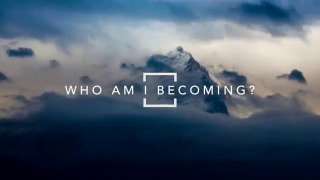 Reading this week's Torah portion Toldot, this year, my heart goes out to Esau.
Reading this week's Torah portion Toldot, this year, my heart goes out to Esau.
His father Isaac senses that death is near, so he sends Esau out hunting so he can prepare some game and receive his father's innermost blessing. When he arrives at Isaac's knee, he discovers that Isaac has given that blessing already to Jacob. "Have you not reserved a blessing for me?" asks Esau.
And Isaac replies, "But I have made him master over you: I have given him all his brothers for servants, and sustained him with grain and wine. What, then, can I still do for you, my son?"
Esau says to his father, "Have you but one blessing, Father? Bless me too!" and weeps aloud. The commentator known as the Radak embellishes Esau's words: "can you not even grant me a blessing concerning any aspect of life which you have not given him?"
Isaac blesses him to enjoy the fat of the earth and the dew of heaven above. "By your sword you will live, and you shall serve your brother," Isaac continues, "but when you grow restive you shall break his yoke from your neck."
Isaac is limited by his own zero-sum thinking and his preoccupation with the idea that one of his sons has to come out on top. Having blessed Jacob to rule over his brother, now he seems at a loss for what to say to Esau.
Jewish tradition invites us to identify with Jacob, who will eventually be renamed Yisrael, One Who Wrestles With God -- the name that inheres in our peoplehood. But I invite us tonight to identify with Esau. Feel what it's like to be the older brother who ought, by all rights, to inherit land, blessing, good fortune. The brother who did all the right things, and now learns that he faces servitude rather than promise. When we inhabit Esau's place, rather than Jacob's, how does Isaac's blessing make us feel?
It's easy to see Isaac's blessing to his older son as a kind of back-handed slap. "You'll live by the sword, and your brother will dominate you until you overthrow him." But I think we can find more in it if we try.
The first part of Isaac's blessing is the same for both of his sons. Isaac blesses both of his sons with the dew of heaven, which our tradition understands as a symbol of grace. Torah too is compared to dew. Dew is the sustaining abundance that arises even in the desert, and grace is everyone's birthright even when we're in tough spiritual places. We too can receive Isaac's blessing of dew: sustenance and nourishment for our tender places, kindness and wisdom to balm our sorrows and uplift our hearts.
The next part of Isaac's blessing has to do with living by the sword. The Radak says this is the part of the blessing that is most exclusively Esau's. We can understand it as the blessing of strength and prowess, the ability to defend oneself. At times when we may feel anxious about those who seek power over us -- whether in our families, or our workplaces, or the public sphere -- we can draw strength from Isaac's blessing of skilled and ready self-defense.
And finally, Isaac's blessing offers the certainty that the day will come when Esau will serve no longer. His future may contain servitude to his brother, but that servitude will not last forever. This may be the most important part of Isaac's blessing, because it contains the seeds of hope. At times when we feel subjugated or mistreated, we can draw strength from Isaac's blessing that things will get better. Isaac's blessing reminds Esau (and us) that the tight places in life are temporary and will pass.
We all have times when we feel like Esau. Cheated and mistreated, in tight straits through no fault of our own. We all know what it's like to be dealt a hand of cards that is not the one we had hoped for. To receive something that may not feel like a blessing: a bad diagnosis, or a door that closes, or a relationship that ends. In those moments we may feel like Esau, who came to his father seeking a sweet blessing and received a bitter one instead.
But even bitter blessings have the capacity to open us up to abundance. And developing the skill of learning to find the abundance concealed within the disappointment, the silver lining concealed within the raincloud, the gifts concealed within the blessing of the thing we didn't ask for and didn't want, can serve us well when times are hard -- and even more so when times are sweet.
My prayer for each of us is this: When the rains don't come, may there be dew, sustenance that nourishes even when our surroundings are spiritually dried-up. When we are in tight straits, may adversity help us hone our strength and our skills.
And when others act as though they have power over us, may we take comfort in the knowledge that our calling is to serve not those who claim dominance, but rather the Source of All. May we take comfort in knowing that we were not put on this earth to be diminished, but to be nourished and to grow until we can break the shackles of injustice. May we take comfort in knowing that even (or especially) when the night seems dark, we can have faith in the coming of the dawn.
May Isaac's blessing for Esau this year impel us to awareness of our inner resources and our gifts. May our tradition nourish us like the dew. And may we release ourselves into the highest forms of service, and in so doing find faith in our own becoming.

Rachel Barenblat's Blog
- Rachel Barenblat's profile
- 6 followers


